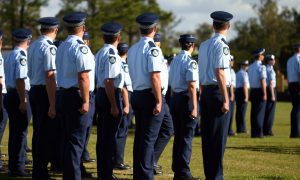
How to Become a police Officer in Washington State
Table of Contents
Top 3 Reasons to Become a
Cop in Washington State
Salary
Police officers in the state of washington enjoy a significantly higher pay grade than that of the national average for cops in other states.
Benefits
Law enforcement agencies in washington state offer really good benefits such as paid vacations, retirement plan, dental, health insurance and more.
Career Advancement
The specialized units that you can join are endless like SWAT, Mount Patrol, Bomb Squad, K-9, School Resource Officer, Detective Unit, and more.
WATCH: The Pros and Cons of Being a Cop
Requirements To become a cop in washington state
Basic Qualifications: Do you qualify?
- Must possess a High School Diploma, G.E.D. or equivalent.
- Must possess a valid Nevada driver’s license.
- Must be a U.S. citizen by the time of application
- Must be at least 21 years of age
- Must have no felony convictions
- Must have no convictions for offenses of domestic violence
- Must not have a poor credit history where multiple accounts are in collections
- Must be someone of good moral character & reputation
- Must not have any discriminatory & offensive tattoos
Disqualification Factors to Consider
Likely Disqualifiers
- Being dishonest during any phase of the hiring process
- Positive drug test result
- Dishonorable discharge from the military
- Convictions involving domestic battery
- Criminal case where disposition is still pending
- Driving privileges are currently suspended
- Arrest history that show a Pattern of lawlessness
- Driving record that show a pattern of disobeying traffic laws
The hiring Process
- Online Application
- Written Examination
- Fitness Test
- Preliminary
- Interview
- Background evaluation
- Polygraph Examination
- Psychological Test
- Medical Examination
According to U.S. labor of bureau statistics (2018) the average salary for a police officer in washington State is...
* The Base Pay Above Does Not Include Holiday Pay, Longevity Pay, Education Level, Uniform Allowance, Shift Differential And Overtime. Cops Can Potentially Earn More Than The Figure Above Suggest.
wA Police Compensation Wage Chart
The percentile wage estimate below is the value of a wage below which certain percent of workers fall. Data collected from U.S. Bureau of Labor Statistics (2018)
Career Path Opportunities
Specialized Units
- Criminal and Gang Intelligence
- Family Crimes
- Child Abuse
- Sex Offense
- Cyber and Electronic Crimes
- Homicide
- Robbery
- Mounted
- Traffic
- Investigative Services
- Special Victims
- Crimes Against Persons
- Missing Persons
- Computer Crimes
- Fraud and Property Crimes
- Narcotics
- Multi-Agency Task Force positions
• Bike Unit
• K9
• Traffic (Motors)
• SWAT
• Professional Standards
• Internal Affairs
• Homeland Security
• Community Relations
• Field Training Officer
• Training and Development
• Recruitment and Backgrounds
• Public Information Office
WA Basic Law Enforcement Academy Curriculum
The 720 hour Basic Academy curriculum is designed to provide recruit officers with the basic knowledge and skills necessary for safe, proper and effective law enforcement service. Instructional blocks include: Criminal Law and Procedures; Traffic Enforcement; Cultural Awareness; Communication Skills; Emergency Vehicle Operations Course; Firearms; Crisis Intervention; Patrol Procedures; Criminal Investigation and Defensive Tactics.
- Criminal law and procedures
- Traffic enforcement
- Cultural awareness
- Communication skills
- Emergency Vehicle Operations Course
- Firearms
- Crisis intervention
- Patrol Procedures
- Criminal Investigation
- Defensive Tactics
- report writing
- Active Shooter
- Ethics
- courtroom testimony
- taser training
Race & Ethnic Diversity in the state of washington
Crime Rate & Statistics
Top 5 most Dangerous Cities to Be a cop in WA
- Kent
- Federal Way
- Tacoma
- Spokane
- University Place
*Source: seattletimes.com
Top 10 Safest Cities to be a cop in the state of washington
- Snoqualmie
- Oak Harbor
- Sunnyside
- West Richland
- Enumclaw
- Grandview
- Washougal
- Lynden
- Bainbridge Island
- Battle Ground
*Source: seattletimes.com
Top 10 Most Expensive Cities to Be A Cop in WA
- Clyde Hill
- Medina
- Mercer Island
- Woodway
- Sammamish
- Bellevue
- Bainbridge Island
- Newcastle
- Issaquah
- Redmond
*Source: Neighborhoodscout.com
Top 10 Highest Paying police Departments/Cities in wA
- Darrington
- Clallam Bay
- Chewelah
- Cle Elum
- Kahlotus
- Lind
- Chattaroy
- Battle Ground
- Deer Park
- Davenport
*Source: Neighborhoodscout.com
Find Police Jobs in Washington State
Click below to search for police jobs near me in WA. Browse jobs by city/county or zip code
Police Officer Requirements In Washington State
**IMPORTANT**
The information below is subject to change, and may have already changed. Please visit the official webpage of the law enforcement agency that you’re interested in working for.
Becoming a member of the Washington State Patrol places you in an exclusive group within the law enforcement community. The Washington State Patrol was the third state law enforcement agency in the nation to be accredited by the Commission on Accreditation for Law Enforcement Agencies (CALEA).
State Police Duties:
A Trooper’s Mission and Responsibilities:
- Provide a safe environment for all citizens within Washington State.
- Assist in the prevention of traffic accidents.
- Expedite the safe and efficient flow of traffic.
- Support other law enforcement agencies in combating crime.
- Provide service and assistance wherever and whenever necessary.
REQUIREMENTS & QUALIFICATIONS
To apply, you must meet the following criteria:
- Be a citizen of the United States.
- Possess a valid, unrestricted Washington driver’s license at the time of employment.
- Be at least 21 years of age.
- Possess a certificate of high school completion or the equivalent.
- Have uncorrected vision not worse than 20/100 in each eye, corrected to 20/25.
- Be willing to work weekends, holidays, rotating shifts and be on 24-hour call.
- Have no felony convictions. Have no misdemeanor convictions involving theft, crimes of violence, larceny, moral turpitude, controlled substances, driving under the influence of alcohol and/or drugs, hit-and-run or reckless driving.
- Be free from the use of narcotics or controlled substances.
- Have a well-proportioned body and be in compliance with departmental height and weight or body fat standards.
- Be approved for employment after a thorough background investigation.
- Successfully pass a pre-employment polygraph examination.
- Successfully pass a departmental medical examination.
- Successfully pass a departmental psychological examination.
- Be willing to accept statewide assignments.
TESTING & PLACEMENT
Phase One consists of two written examinations. Applicants are notified in writing of test dates.
The first examination is designed to evaluate an applicant’s judgement and common sense. The examination contains situational questions with multiple-choice answers.
The second examination is a learning ability test, designed to evaluate the candidate’s observation skills, written communication skills, and reading comprehension. The test also asks information about the candidate’s background and personality.
Those applicants with qualifying accumulative scores advance to Phase Two. They are instructed to complete a background questionnaire and are scheduled, if possible, for the next phase prior to departing from Phase One.
Phase Two consists of an oral interview within two weeks of Phase One, but may be scheduled up to one month later.
The oral interview consists of general personal background questions and situational questions requiring the applicant to formulate a response to solve or deal with a given problem.
The height and weight of the applicants are checked to ensure they meet departmental standards. Applicants are notified within two to three weeks if their accumulative scores have advanced them into Phase Three.
Phase Three consists of a pre-employment polygraph examination and an extensive background investigation.
Applicants who pass through Phases One, Two, and Three and obtain enough cumulative points will be placed on the eligibility roster.
Applicants who pass through Phases One, Two, and Three, but did not obtain enough cumulative points to be placed on the eligibility roster, may retest six months from the time of the written test.
Applicants on the eligibility roster may be given a conditional offer of employment approximately one month before hiring begins. Hiring of an applicant is contingent upon the successful completion of Phase Four.
Phase Four consists of a medical examination, a post-offer psychological test, and a psychological interview with the department psychologist. Applicants must also provide proof of a current TB (tuberculosis) test. Females are required to deliver results of a recent pap smear test.
Hiring & Placement:
Upon passing Phase Four, the applicant is given an offer of employment to the position of trooper cadet.
Trooper cadets are assigned to full-time paid positions with either the Commercial Vehicle Division, Mansion Security, or other positions as needed. Trooper Basic Training is not guaranteed, since trooper cadets are selected to basic training on a competitive basis. The selection process may consist of an academy history questionnaire, physical fitness test, and an oral interview.
TRAINING & COMMISSIONING
Trooper cadets become commissioned as troopers after successfully completing approximately seven months of Trooper Basic Training, which is conducted at the Washington State Patrol Academy located in Shelton, Washington.
Training is provided in the following areas:
- firearms
- driving
- self-defense
- accident investigation
- first aid
- traffic and criminal law
- water safety
- physical fitness
Upon graduation, each newly commissioned trooper is assigned to patrol duty in one of the State Patrol’s eight districts located throughout the state.
BENEFITS & SALARIES
Benefits:
- All uniforms and equipment, including side arms, furnished by the department.
- Retirement plan, with optional retirement at age 55 or 25 years of service for commissioned officers.
- Life insurance and medical, dental, and hospitalization programs subsidized by the state.
- Annual vacation leave accrued at one day a month, and increases with longevity.
- Sick leave accrued at one day a month.
Salaries:
In addition to the monthly salaries listed below, commissioned employees are also eligible for longevity, specialty, shift differential, and educational pay.
Trooper Cadet
SPECIALTY POSITIONS & RANK STRUCTURE
Specialty Positions:
The Washington State Patrol offers a variety of specialty assignments, which are available to all commissioned officers.
Non-probationary commissioned officers with four years of experience can compete for detective assignments in the following specialties:
- Traffic Accident Investigation
- Narcotics
- License Fraud
- General Investigations
- Auto Theft
- Organized Crime
- Internal Affairs
Rank Structure:
- Trooper Cadet
- Trooper
- Sergeant
- Lieutenant
- Captain
- Commander
- Assistant Chief
- Chief
Washington State Patrol title head Employment Requirements
The following evaluation is part of the examination procedure for employment with the Washington State Patrol. A personal background evaluation requires you to provide the following information at the time of application. All information provided on the evaluation will be verified by polygraph examination.
Untruthful responses OR excessive prior drug use will result in your rejection.
“Possession” is defined as control, touching, holding, selling, or trafficking (transportation for sale) any illegal (non-prescribed) drug.
- No possession of marijuana/hashish within the last 3 years. No possession of other illegal drugs within the last 10 years.
- No possession of marijuana/hashish over 15 times, regardless of the time frame. No possession within the last 3 years.
- No injection of amphetamines or methamphetamines.
- No possession of non-prescribed stimulants (amphetamines/methamphetamines), such as speed, Ritalin, crank, crystal, ice, etc., over 3 times. No possession within the last 10 years.
- No possession of hallucinogenic drugs (LSD, PCP, hallucinogenic mushrooms, etc.) over 3 times. No possession within the last 10 years.
- No possession of non-prescribed opiates or narcotics (heroin, morphine, etc).
- No possession of cocaine over 3 times. No possession within the last 10 years.
- No possession of non-prescribed drugs after submitting an application with any law enforcement agency within the last 5 years. The type of agency and circumstances of possession will be considered on a case-by-case basis.
- No possession of non-prescribed drugs while employed or after having been employed by a law enforcement agency, regardless of time frame. The type of agency and circumstances of possession will be considered on a case-by-case basis.
- No possession of anabolic steroids within the last two years.
Do you qualify? Ask yourself these questions:
(if your answer is “yes” There is a very high probability that your application will be rejected):
- Have you ever been convicted of a felony? ___Yes ___No
- Have you ever been convicted of a misdemeanor involving theft, crimes of violence, larceny, moral turpitude, sex offenses, or controlled substances? ___Yes ___No
- Have you ever sold, offered to sell, or transported for sale any illegal drugs/narcotics, regardless of the time frame? ___Yes ___No
- Have you been convicted of DUI, reckless driving, or hit-and-run within the last 3 years? ___Yes ___No
Who Can Attend the Academy:
All full-time commissioned law enforcement personnel of a city, county, or political subdivision of the state of Washington, unless otherwise exempted by the Washington State Criminal Justice Training Commission, shall as a condition of continued employment successfully complete a basic law enforcement academy sponsored or conducted by the commission, or obtain a certificate of equivalent basic training from the commission.
* Excludes volunteers and reserve officers (paid or unpaid) and Washington State Patrol.
Overview
Before you can become a police officer, you must complete 720 hours of basic law enforcement academy (BLEA) training within six-months of hire to the law enforcement agency you are employing with. All academy recruits must be physically able to actively and fully participate in the defensive drills as well as other required physical activities in accordance with WAC 139-05-230. The Criminal Justice Training Commission currently requires passing of a variation of the Cooper Test for entry to the academy. Most law enforcement agencies require that you:
1. Be a U.S. Citizen.
2. Be 21 years of age or older.
3. Have a high school diploma or GED.
4. Have a valid Washington State driver’s license.
Keep in mind, we are a state government training facility, we do not employ police officers or sheriff’s deputies. You may want to contact individual law enforcement agencies in the area to request their entry-level requirements.
We are the only police academy in Washington State; however, there is a separate academy, in Shelton, conducted by the Washington State Patrol.
Basic Law Enforcement Academy
Personnel initially employed on or after January 1, 1990, shall commence basic training during the first six-months of employment unless the basic training requirement is otherwise waived or extended by the commission. Successful completion of basic training is requisite to the continuation of employment of such personnel initially employed on or after January 1, 1990.
The Washington State Criminal Justice Training Commission is responsible for the conduct of the basic law enforcement academy and to therein certify, to and for the state of Washington, those officers who have demonstrated the ability and suitability requisite to law enforcement service and the publics trust.
Applicant Registration Information
The Criminal Justice Training Commission Basic Law Enforcement Academy will not accept Jane Doe or John Doe applications. In order to be processed, all applications must be received from the sponsoring agency prior to the posted selection date.
The application will be reviewed on the selection date and the criteria used for class selection will include the following:
1. Mandated/Non-mandated agency status.
2. Officers or deputies nearing the six-month requirement.
3. Date of application.
4. Size of sponsoring agency.
5. Statements of agency need and/or hardship.
Background Check
In accordance with that responsibility, and to ensure the continuing integrity and credibility of the basic academy program, no individual shall be granted academy admission or allowed continued participation if such individual, in adult status, has been convicted of a felony offense, or has been convicted of a gross misdemeanor or misdemeanor involving moral turpitude.
For this purpose, the term “convicted” shall include any disposition adverse to the subject, except a decision not to prosecute, a dismissal, or acquittal; provided, however, that a dismissal entered after a period of probation, suspension, or deferral of sentence shall be considered a disposition adverse to the subject.
The term “felony offense” shall include any act or omission, which is classified as a felony by the laws of the jurisdiction in which such act or omission occurred, or for which imprisonment in a federal or state penitentiary could have been imposed.
It shall be the responsibility of each sponsoring or applying agency to request a complete criminal records check to include a search of state and national criminal history records information regarding its applicant through the submission of the applicant’s fingerprints to an appropriate action agency or agencies.
Each application for academy attendance shall be accompanied by a written attestation by the applying agency that (1) the aforementioned criminal records check has been effected regarding the individual for which academy application is being made, and (2) that such search indicated the absence of any felony conviction or other disqualifying conviction.
No exception to, or variance from, the above requirements or the prohibition that is provided, will be granted without the approval of the training commission.
Physical Ability Test (PAT)
Each successful applicant for admission to a basic law enforcement academy sponsored or conducted by the Washington State Criminal Justice Training Commission shall possess good health and physical capability to actively and fully participate in defensive tactics training and other required physical activities. In order to minimize risk of injury and maximize the benefit of such participation, each recruit in any academy session shall, as a precondition of his or her academy attendance, demonstrate a requisite level of physical fitness, as established by the training commission.
For this purpose, each academy applicant shall be evaluated in the assessment areas of aerobic capacity, strength, and flexibility, in accordance with the requirements and procedures established by the training commission.
Failure to demonstrate a requisite level of fitness will result in ineligibility for academy admissions and/or attendance.
Find Law Enforcement Jobs in WA
Law Enforcement Agencies in Washington State
Adams County Sheriff Department
Asotin County Sheriff Department
Benton County Sheriff Department
Chelan County Sheriff Department
Clallam County Sheriff Department
Clark County Sheriff Department
Columbia County Sheriff Department
Cowlitz County Sheriff Department
Douglas County Sheriff Department
Ferry County Sheriff Department
Franklin County Sheriff Department
Garfield County Sheriff Department
Grant County Sheriff Department
Grays Harbor County Sheriff Department
Island County Sheriff Department
Jefferson County Sheriff Department
King County Sheriff Department
Kitsap County Sheriff Department
Kittitas County Sheriff Department
Klickitat County Sheriff Department
Lewis County Sheriff Department
Lincoln County Sheriff Department
Mason County Sheriff Department
Okanogan County Sheriff Department
Pacific County Sheriff Department
Pend Oreille County Sheriff Department
Pierce County Sheriff’s Department
San Juan County Sheriff Department
Skagit County Sheriff Department
Skamania County Sheriff’s Offic
Snohomish County Sheriff Department
Spokane County Sheriff Department
Stevens County Sheriff Department
Thurston County Sheriff Department
Wahkiakum County Sheriff Department
Walla Walla County Sheriff Department
Whatcom County Sheriff Department
Whitman County Sheriff Department
Yakima County Sheriff Department
Aberdeen PD
Airway Heights PD
Algona PD
Anacortes PD
Arlington PD
Auburn PD
Bainbridge Island PD
Battle Ground PD
Bellevue PD
Bellingham PD
Bingen-White Salmon PD
Black Diamond PD
Blaine PD
Bonney Lake PD
Bothell PD
Bremerton PD
Brewster PD
Brier PD
Buckley PD
Burlington PD
Camas PD
Castle Rock PD
Centralia PD
Chehalis PD
Chelan PD
Cheney PD
Chewelah PD
Clarkston PD
Clyde Hill PD
Colfax PD
College Place PD
Colville PD
Connell PD
Coulee City PD
Coulee Dam PD
Centralia PD
Cosmopolis PD
Coupeville Marshal’s Office
Des Moines PD
DuPont PD
Duvall PD
East Wenatchee PD
Eatonville PD
Edmonds PD
Ellensburg PD
Elma PD
Enumclaw PD
Ephrata PD
Everett PD
Everson PD
Federal Way PD
Ferndale PD
Fife PD
Fircrest PD
Forks PD
Gig Harbor PD
Goldendale PD
Grand Coulee PD
Granite Falls PD
Grandview PD
Granger PD
Hoquiam PD
Issaquah PD
Kalama PD
Kelso PD
Kennewick PD
Kent PD
Kettle Falls PD
Kirkland PD
Kittitas PD
La Center PD
Lake Forest Park PD
Lake Stevens PD
Lacey PD
Langley PD
Liberty Lake PD
Long Beach PD
Longview PD
Lynden PD
Lynnwood PD
Mabton PD
Mattawa PD
Marysville PD
McCleary PD
Medical Lake PD
Medina PD
Mercer Island PD
Mill Creek PD
Milton PD
Monroe PD
Montesano PD
Morton PD
Moses Lake PD
Mossyrock PD
Mount Vernon PD
Mountlake Terrace PD
Mukilteo PD
Napavine PD
Newport PD
Normandy Park PD
North Bonneville PD
Moses Lake PD
Oak Harbor PD
Oakesdale Marshal’s Office
Ocean Shores PD
Odessa Town Marshal’s Office
Olympia PD
Omak PD
Oroville PD
Orting PD
Othello PD
Pacific PD
Palouse PD
Pasco PD
Port Angeles PD
Port of Seattle PD
Port Orchard PD
Port Townsend PD
Poulsbo PD
Prosser PD
Pullman PD
Puyallup PD
Quincy PD
Rainier PD
Raymond PD
Redmond PD
Republic PD
Renton PD
Richland PD
Ridgefield PD
Ritzville PD
Roy PD
Royal City PD
Ruston PD
Seattle PD
Selah PD
Sedro-Woolley PD
Sequim PD
Shelton PD
Shoreline PD
Snohomish PD
Snoqualmie PD
Soap Lake PD
South Bend PD
Spokane PD
Spokane Valley PD
Stanwood PD
Steilacoom Public Safety Department
Stillaguamish PD
Sultan PD
Sumas PD
Sumner PD
Sunnyside PD
Tacoma PD
Tenino PD
Tieton PD
Toledo PD
Tonasket PD
Toppenish PD
Tukwila PD
Tumwater PD
Twisp PD
Union Gap PD
Uniontown PD
Vancouver PD
Walla Walla PD
Wapato PD
Warden PD
Washougal PD
Wenatchee PD
West Richland PD
Westport PD
Wilbur PD
Winlock PD
Winthrop PD
Woodland PD
Yakima PD
Yelm PD
Zillah PD




